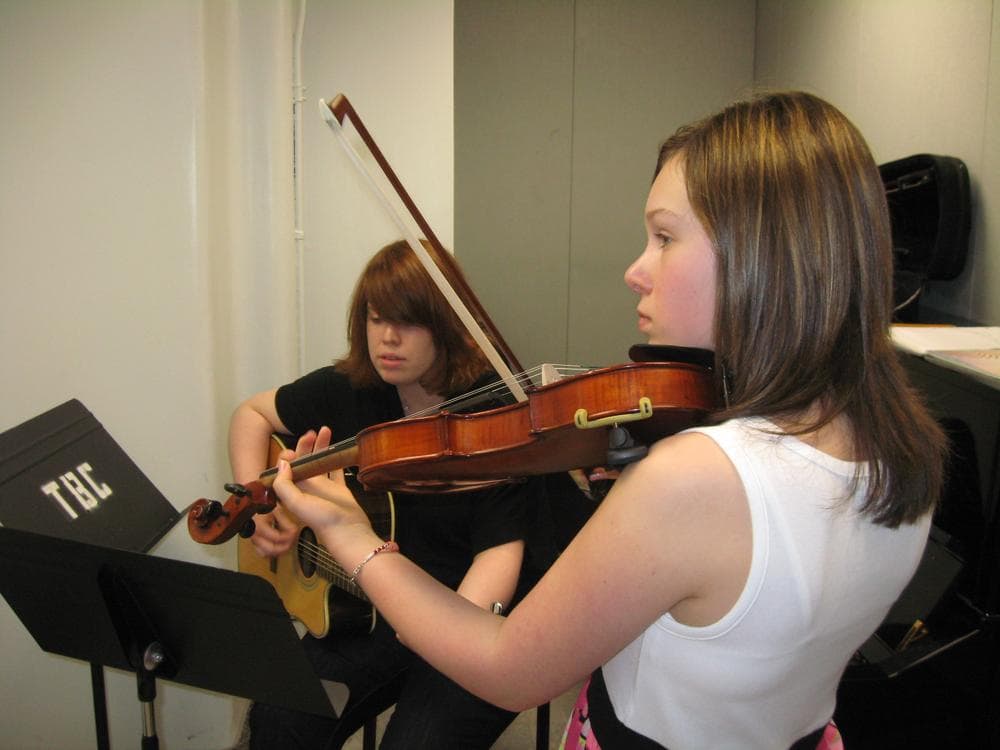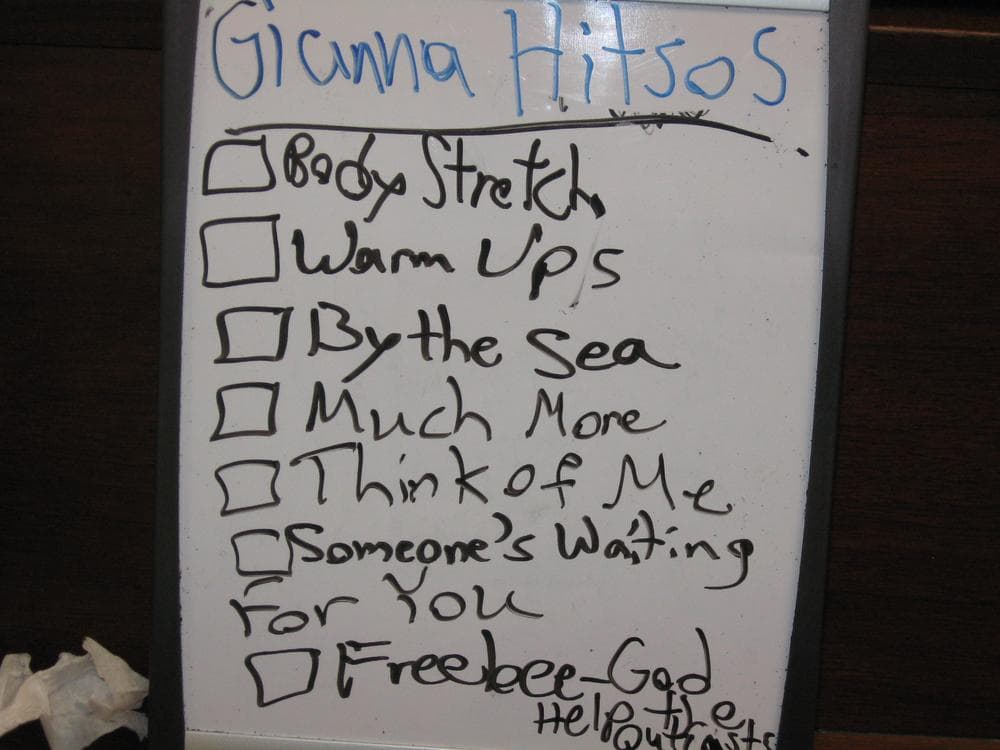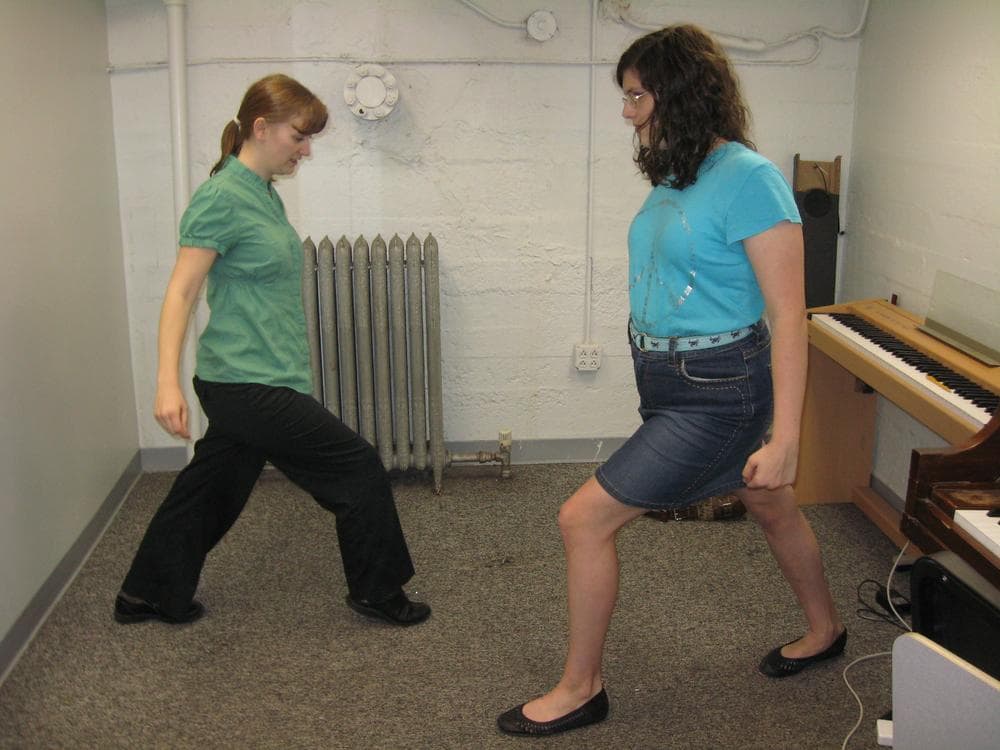Advertisement
A Music Program For Autistic Kids That Has Nothing To Do With Therapy
Some children with autism have a special affinity for music. It seems to calm them down and give them an easier way to express themselves. So music therapy has become popular for many autistic kids. But one music program at the Boston Conservatory is specifically for kids with autism — and it has nothing to do with therapy.

BOSTON — Gianna Hitsos is an eighth grader from Groton with an ambitious project: she's making a CD of herself singing her favorite Broadway songs.
That's a big deal for Gianna. Because when she was about one year old — just as she started saying words like "daddy" and "puppy" — she suddenly stopped talking. She didn't talk again until she was almost three. The diagnosis was autism.
Now she gets private voice lessons at the Boston Conservatory on Saturdays during the school year. Other autistic kids in the same program study piano or guitar or violin. But they're not here to learn to make eye contact or understand social cues or any of the other communication skills many kids with autism lack.
They attend to become better musicians. Period.
The program's goal is to give autistic kids musical opportunities that could change their futures: Maybe playing in an orchestra, maybe performing in a band.
Studying The Same Music Skills They'd Learn In College
With a grad student from the conservatory as her teacher, Gianna learns technique, form, repertoire, theory, composition — the same skills she'd study as a music student in college. In fact, she now hopes she'll go to college and study music, maybe right here at the conservatory. And that's not her only goal.
"I feel like if I actually performed, and being able to take voice lessons, I can improve my singing skills and hopefully make it big," Hitsos says.
If making it big is what these students want to do, that's what their instructors try to help them do.

Now, kids with autism sometimes need a different teaching approach. Rhoda Bernard, who chairs the conservatory's music education program, says autistic students often struggle with abstract concepts, including the idea that the musical alphabet only goes from A to G.
"One of students in the program last year had trouble," Bernard recalls. "He wanted to go to H and keep going through the alphabet."
So a teacher took a strip of construction paper, folded it into a circle, like a bracelet, and wrote the letters A through G. Then the student wore the bracelet on his wrist.
"So this child would then turn to the next letter, and after G it goes to A, so that this loop was very concrete," Bernard explains, "and this was what unlocked the door to understanding the musical alphabet."
With Autistic Kids, Talents Can Take Time To Shine Through
"For a lot of kids with autism, it takes a while for you to see their gifts," adds Vanda Khadem, who runs the Autism Higher Education Foundation in Chestnut Hill. She suggested this program to the Boston Conservatory after hearing lots of stories about autistic kids showing a knack for music after years of developmental problems.
"There are so many other challenges they have in terms of communication and the sensory issues and the anxiety," she says, "and so by the time they're able to get it all together, you may not see an interest or a talent in a child with autism until they're older."

Lindsey Melo is a 12-year-old from Dartmouth who comes to her weekly lesson with her mother, Kelly. Students have to be at least nine years old to get into the program and have to have basic music proficiency already. Lindsey had been studying violin for more than a year when she signed up, but now she plays several styles of music, from classical to fiddle tunes to rock.
This is a child who didn't speak until she was almost five and still has a lot of social issues. But when she plays the violin, Lindsey is poised and confident and expressive. That's why her mother says the $1,000-a-semester price tag is worth it.
"Basic things, such as getting dressed, she couldn't do," Kelly Melo says. Yet "she picked up a violin and was able, as you see her fingers moving — it's just amazing to think that this child, who had so many obstacles, has been able to pick up this instrument and play it."
This program aired on May 20, 2010.
